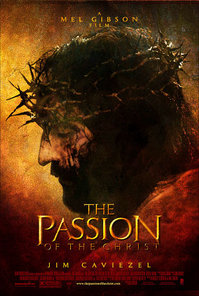The Passion of the Christ
The Passion of the Christ (2004) is an independent film about the last twelve hours of the life of Jesus Christ. It is directed by Mel Gibson. The film’s dialogue is in Latin, Hebrew, and Aramaic, which was Jesus' mother tongue. The movie was released with subtitles. more...
It was filmed on location in Matera, Italy and Cinecittà Studios, Rome, Italy.
After months of interest and controversy (primarily over alleged anti-Semitism and the film's heavy gore) that led to record pre-release sales, the movie opened in the United States on February 25 (Ash Wednesday, the beginning of Lent), 2004. Taking $370m in the U.S., it became the highest-grossing R-rated film ever made, and had, for a time, the eighth highest all-time domestic gross (it has since dropped to tenth place). It is also one of the few movies to lose and then regain the#1 box-office ranking (it regained the top spot, as expected, on the 2004 Easter Weekend).
An edited version of the film was released on March 11, 2005 as The Passion Recut. Mel Gibson removed approximately five minutes of the most graphic footage in an effort to broaden the audience of the film. However, this version was not terribly successful (just 950 theaters in North America, averaging just 10 viewers per showing,) and was quickly pulled from theaters. Even edited, the Motion Picture Association of America still deemed the film too violent to give a PG-13 rating, so Gibson released it without a rating, which limited it due to policies of some chains and independent theaters to not show unrated films. Others simply passed on The Passion Recut because the original version was already available on DVD and VHS.
Critics were polarized over the film. According to the website RottenTomatoes.com only 51% of critics praised the film but 76% of users loved it . Similarly, critics rate it a B− , but users of Yahoo! rate it a B+.
Making of
Mel Gibson played many crucial roles in getting The Passion of the Christ made, and it has been called “Mel’s labor of love.” Gibson personally committed an estimated $40m to $50m of his own resources to finance and advertise the film. In addition to directing, Gibson co-produced and co-wrote the screenplay with Benedict Fitzgerald.
Because of the subject, the graphic violence in the film, and, most of all, because the actors in the film spoke Aramaic, Gibson reportedly had difficulty finding a company to distribute it in the United States. In fact, the film was completed before a distributor, Newmarket Films, agreed to release it in the U.S. In Canada, Equinox Films was the distributor. Icon Films distributed it in the United Kingdom.
In addition to the attacks of anti-Semitism from many Jews and liberal Christians, Gibson’s traditionalist Catholic beliefs were also a frequent target by critics. The film was seen by many critics to be nothing less than a modern-day Passion play that propagates the Jews' guilt of deicide. However, Jewish Romanian actress Maia Morgenstern (who played Mary), who is the daughter of a Holocaust survivor, rejects these criticisms. In an interview filmed for the PAX documentary about the making of the film, Morgenstern said that she had read the script with her father and they both found it "beautiful, very poetic, and very philosophical."
Read more at Wikipedia.org



